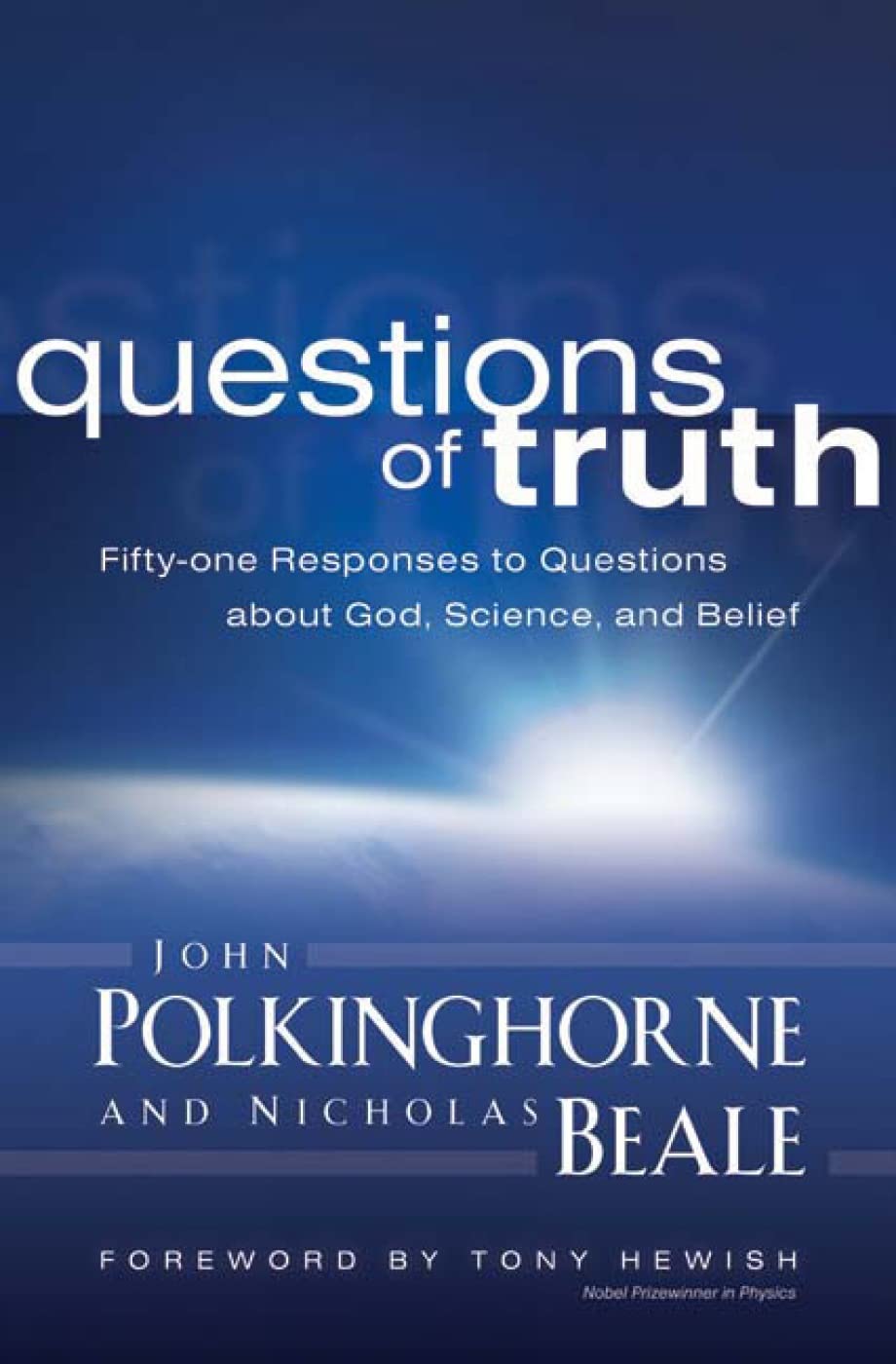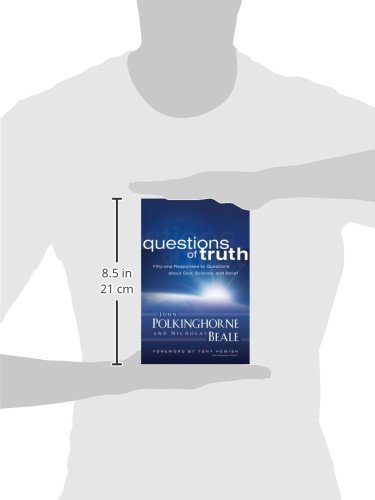



Questions of Truth: Fifty-one Responses to Questions About God, Science, and Belief
T**Z
I liked it!
I downloaded the Kindle version. I do wish they would include real page numbers in the format.As a believer who just loves astronomy and started to dabble in quantum theory, I found the book to have some really great insights. I didn't get the impression that the authors were trying to convert anyone, but just presented their thoughts on the subjects at hand.I found their answers to the issues presented by Dawkins to be well thought out, and had much more science behind them than many people have ever heard. Too many people just take Dawkins and his colleagues at face value, and just eat up everything they say.I've read other books by scientists who were Christian, but none of them, so far, have delved so deep and broadly as Polkinghorne.Polkinghorne does, however, ascribe to Open Deism, and comes as close to being a Universalist as one can. I understand his answers, I disagree, but that didn't prevent me from enjoying his answers.Die hard atheists and Christian Fundamentalists will not like this book unless they're willing to at least approach it with a desire to hear another point of view.Overall, great book! The science is deep, might not be for casual readers, but well informed seekers will find it at least interesting.
S**N
A modern catechism for science and religion
John Polkinghorne is a Cambridge physicist who decided, mid-career, to become an Anglican priest. Like a good scientist working out a theory, he worked out how his orthodox Christian beliefs were essentially compatible with modern physics. He has won international acclaim and awards for his insights about religion and science. Especially central to his contributions is the idea that both disciplines require a certain amount of belief and faith. This book, compiled with his collaborator Beale, explains in short form his approach to religion and science.This book is organized around 51 questions about seven topics, including God, the universe, evolution, and religion. The writing is quite dense and carefully considered. Along with Polkinghorne’s other works, this book provides a concise introduction to how modern science and religion can be viewed as essentially compatible. It reads almost like a catechism about the integration of science and religion.Central to Polkinghorne’s insights is the idea of the “anthropic principle” where the universe requires some degree of fine-tuning to support human life. He sees an opening for a divine agent. He also moves the conversation on from the framework of a purely mechanistic universe. Through quantum science – referred to consistently in this work – science has moved on past a mechanical/deterministic philosophy. He invites religion to do the same by finding God in the details of quantum atomic arrangements.Polkinghorne’s writings are not for the faint of heart. They require a certain knowledge of physics as a prerequisite, and many religiously inclined individuals will simply not possess this. That said, it does describe the scientific theories behind Polkinghorne’s beliefs, and the motivated reader can slow down to gather knowledge. The integration of science and religion is an important topic that, due to a high degree of requisite education, few can speak knowledgeably about. This book is an significant contribution to that discussion. If faith is to have a place in the minds of the modern intelligentsia, works like this must be a key part of that discussion.
G**
Quite the good read
Quite the good read. Certainly not an answer to everything, which it doesn’t advertise, but still sophisticated enough to warrant multiple reads.
R**6
Excellent Introduction to Polkinghorne's Wisdom with Humility
John Polkinghorne is a unique individual; an accomplished particle physicist, he decided to change careers about 30 years ago to become a minister of the Anglican church. A Templeton prize winner, his writing style is lucid and accessible. Questions of Truth is a departure from classics such as Exploring Reality and The Faith of a Physicist in that it is a collaboration between Polkinghorne and his associate Nicholas Beale, who helps with the deluge of e-mail that Polkinghorne receives.This book, while quite short, covers a great deal of ground and effectively signposts the reader to other books by Polkinghorne that deal with specific subjects in greater depth. (page 81) "Every so often in the history of the universe something intrinsically new emerges from within the deep potentiality with which creation has been endowed. This happened with the coming-to-be of life and again with the dawning of animal consciousness. I believe it also happened in the genus Homo with the emergence of human self-consciousness." (page 68) "At some point in hominid evolution, self-consciousness - a deep self-awareness and the power to project our thought far into the future - dawned on our ancestors. At the same time, I believe that a new form of God-consciousness also dawned for them. The fall was the process by which they turned away from God into the self, an error of which we are all the heirs." I am an avid fan of Polkinghorne; he understands the flaws in the quasi-scientific arguments often advanced against faith, but even when he is dealing with crass abuse of logic or science he always tempers his great wisdom with humility and congeniality.
E**A
Excellent accessible text for non-experts in Philosophy
As a scientist myself, but with an interest in philosophy, I found this book to be just what I was looking for in helping to determine whether it is rational (based on our current understanding of the universe and our common experience) to believe that there is such a thing as a "soul" and whether consciousness can exist unembodied (hence if there is an existence after physical death).I'm frequently irritated by fellow scientists who not only have a closed mind but who also can't see the flaws in their own logic (despite some keeping a seemingly irrational "belief" about the nature and limitations of their own research!). Many cling to arguments articulated by Dawkins in The God Delusion, which are incredibly flawed and uncompelling. Equally, I also want to avoid irrational belief in scentifically unverifiable theories. This is where this book comes in.Written with reference to physics (which underlies the other scientific disciplines) and common experience, this book addresses the frequent arguments and questions from both sides of the materialism vs. idealism (and everything in between) philosophies. It's definitely much easier to understand than other texts on this subject (including books by Keith Ward) but it isn't the whole story and will lead you into other texts on the subject.So for anyone looking to read more on this subject, I think this is a good starting point and signpost into further reading. It's also perhaps more accessible for those who are not experienced philosophers as a compelling response to Dawkins and a lead into a truly educated and sound understanding of the subject (unlike Dawkins!).
A**R
Common questions answered about religion answered from a scientific modern ...
Common questions answered about religion answered from a scientific modern perspective.
K**R
....51 Christian responses.........
First let me compliment the author on his knowlege of quantum physics and the mechanism of neural functioning. So often we are led to read books where the author claims to know his topic but then fails miserably in its delivery. The author, however, has a strong tedency to overestimate the knowlege of his audience. If I were not well versed in physics I would have become easily lost in the undefined technical jargon. This is not a book for someone without a moderate scientific background.Secondly, I picked up this book because of its subtitle....." Responses to Questions about God, Science and Belief." The subtitle however, should have read....."From a Christian Viewpoint". The author takes the same, old predictable stance that the Bible is the unerrant word of God and attempts to explain scientific principles on this highly questionable premise. If an initial premise cannot shown to be true, no reliable conslusions can be drawn from it no matter how strongly you wish that they could. Because of that, very few of his conclusions can be taken with a high degree of ethical certainty. There are two initial sequences in early Genesis not because God wishes to teach us two different lessons but because one of them is obviusly wrong (if not both of them)! What then is the purpose of this book other than to be one of the many publications that claim to be based on 'truth' when it is actually based on 'religious faith'? As long as we have religionists who refuse to admit to any level of error in their manner of religious thought we will continue to have the gap between science and spirituality grow, and not lessen, in size.
B**W
Expectations met
The book requested arrived safely in the timescale indicated in the description.
A**R
Big questions on science and faith
Excellent for answers to big questions given from a Christian viewpoint
TrustPilot
1 周前
2 个月前